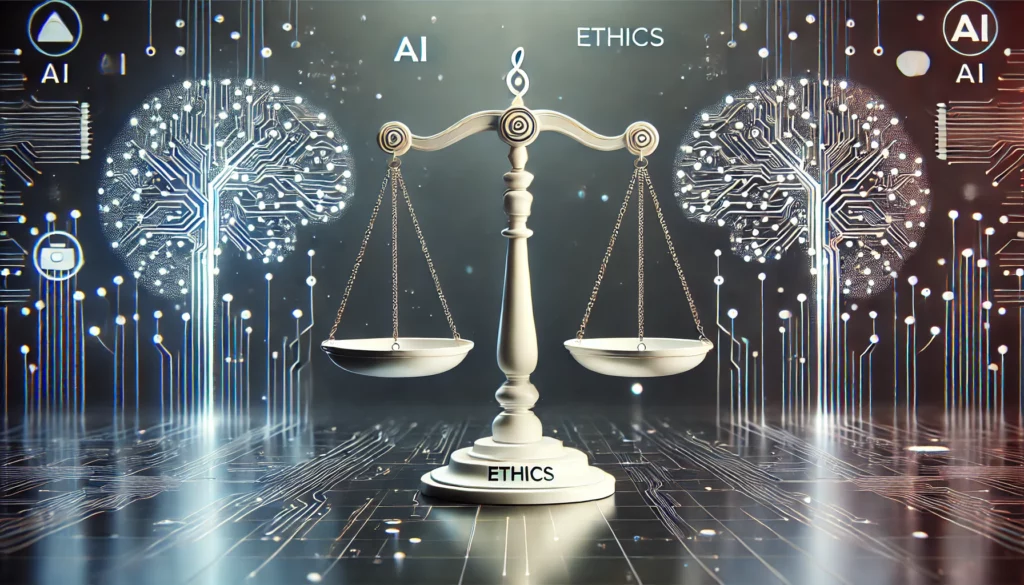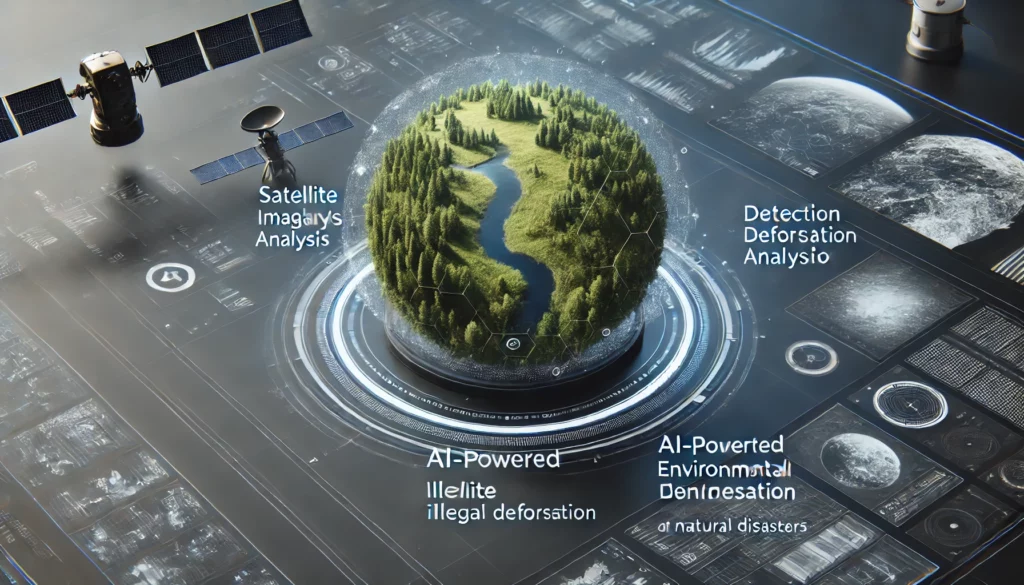Introduction
Artificial Intelligence (AI) is one of the most transformative technologies of our time, capable of revolutionizing industries, enhancing productivity, and improving the quality of life. From healthcare and finance to transportation and entertainment, AI’s potential applications are vast and varied. However, with great power comes great responsibility. As AI technologies continue to advance rapidly, addressing AI ethics becomes crucial. The central challenge lies in balancing technological progress with ethical imperatives like fairness, accountability, transparency in AI, and privacy. This article explores the ethical landscape of AI, examining key issues and proposing strategies to ensure innovation does not come at the expense of ethical responsibility.
Understanding AI Ethics
AI ethics refers to the moral principles and guidelines that govern the development, deployment, and use of AI technologies. These principles aim to ensure AI systems are designed and utilized in ways that uphold human values, respect individual rights, and minimize harm. Transparency and explainability are crucial in achieving this goal. AI systems should operate transparently, allowing users to understand how decisions are made. This involves making the inner workings of AI models interpretable and providing clear explanations for AI-driven outcomes. Techniques such as algorithmic transparency and interpretable machine learning are essential.

Ensuring fairness in AI involves addressing biases that may arise from skewed data, flawed algorithms, or systemic inequalities. AI systems must be trained on diverse and representative datasets to prevent discrimination and unjust outcomes. Techniques such as fairness-aware machine learning and bias detection algorithms help identify and mitigate biases in AI systems. Privacy and data protection are also critical. AI often relies on vast amounts of data, raising concerns about privacy and data security. Ethical AI practices prioritize protecting individual privacy rights through informed consent, data anonymization, and robust security measures. Frameworks like differential privacy and privacy-preserving machine learning enable AI systems to function while safeguarding user privacy.
As AI systems become more autonomous, establishing clear lines of accountability is essential. Stakeholders must be accountable for the outcomes of AI deployments, with mechanisms for error correction and recourse in cases of AI failures or harms. Human oversight should remain an integral part of AI systems to ensure responsible decision-making. AI systems must be designed to operate safely and reliably, minimizing the risk of unintended consequences or catastrophic failures. Ethical considerations include ensuring system robustness, resilience to adversarial attacks, and adherence to safety standards. Techniques such as adversarial training and robustness testing enhance the safety and reliability of AI systems.
Incorporating human-centered AI design principles ensures that AI technologies align with human values and preferences. This involves actively involving stakeholders in the design process, understanding user needs, and prioritizing user well-being and satisfaction. Human-centered design leads to more socially responsible and ethically sound AI systems.
Innovation in AI
The rapid advancements in AI technology have led to significant innovations across various sectors. These innovations hold the promise of transforming industries, improving efficiencies, and enhancing the quality of life. AI is revolutionizing healthcare by enabling more accurate diagnoses, personalized treatments, and efficient patient management. For instance, AI-powered systems can analyze medical images to detect diseases such as cancer at early stages, leading to better patient outcomes. Additionally, AI-driven predictive analytics can help manage hospital resources more effectively and improve patient care.
In the financial sector, AI is being used to detect fraudulent activities, assess credit risks, and automate trading strategies. Machine learning algorithms can analyze large volumes of transaction data to identify patterns indicative of fraud, helping financial institutions prevent losses. AI-driven credit scoring models provide more accurate assessments of borrowers’ creditworthiness, promoting financial inclusion. AI technologies are driving the development of autonomous vehicles, which have the potential to reduce accidents, improve traffic flow, and enhance mobility. Self-driving cars use AI to interpret sensor data, make real-time decisions, and navigate complex environments. Additionally, AI-powered traffic management systems can optimize traffic signals and reduce congestion in urban areas.

AI is transforming the entertainment industry by enabling personalized content recommendations, creating realistic virtual environments, and enhancing gaming experiences. Streaming services use AI algorithms to analyze user preferences and suggest relevant content, improving user satisfaction. AI-driven game engines can generate lifelike graphics and simulate complex interactions, providing immersive gaming experiences. AI is also being used to monitor and protect the environment by analyzing satellite imagery, detecting illegal deforestation, and predicting natural disasters. AI-powered systems can identify changes in land use, track wildlife populations, and assess the impact of human activities on ecosystems. These insights help policymakers make informed decisions to promote sustainability and conservation.
Ethical Challenges in AI
While AI holds immense potential, it also presents significant ethical challenges that must be addressed to ensure responsible development and deployment. AI systems can inadvertently perpetuate biases present in their training data, leading to unfair and discriminatory outcomes. For example, facial recognition algorithms have been shown to perform poorly on individuals with darker skin tones, raising concerns about racial bias. Ensuring fairness in AI requires developing diverse and representative datasets, implementing regular bias checks, and using fairness-aware algorithms.
The extensive data collection required for AI systems raises significant privacy concerns. AI applications in surveillance, healthcare, and social media often involve processing sensitive personal information, posing risks of data breaches and unauthorized access. Protecting data privacy requires implementing robust security measures, obtaining informed consent, and adhering to data protection regulations such as the General Data Protection Regulation (GDPR). The “black box” nature of some AI models makes it difficult to understand how decisions are made, leading to challenges in accountability and transparency. Without clear explanations, users may find it hard to trust AI systems, especially in high-stakes domains like healthcare and finance. Enhancing transparency involves developing explainable AI models, providing detailed documentation, and ensuring that users can understand and interpret AI-driven decisions.
The automation of tasks through AI and robotics can lead to job displacement and economic disruption. While AI can create new job opportunities, it can also render certain occupations obsolete, particularly those involving routine and repetitive tasks. Addressing the ethical implications of job displacement requires investing in reskilling and upskilling programs, promoting workforce adaptability, and ensuring social safety nets for affected workers. The rapid pace of AI development often outstrips existing regulatory frameworks, leading to gaps in oversight and governance. Establishing comprehensive regulations that balance innovation with ethical responsibility is crucial to ensure the safe and ethical deployment of AI technologies. Policymakers, industry leaders, and academia must collaborate to develop standards and guidelines that address the ethical challenges posed by AI.
Balancing Innovation and Responsibility
Achieving a balance between innovation and responsibility in AI development requires a multifaceted approach involving technologists, ethicists, policymakers, and society at large. Establishing clear and comprehensive AI governance frameworks is essential to ensure that AI technologies are developed and deployed ethically. Regulatory frameworks should address issues such as data privacy, algorithmic transparency, bias mitigation, and accountability. International cooperation is also crucial to harmonize regulations and promote global standards for ethical AI.
Integrating ethical considerations into the AI development process can be achieved through best practices such as conducting ethical impact assessments, involving diverse stakeholders in decision-making, and prioritizing user-centric design. Organizations should establish ethical guidelines and codes of conduct to guide AI development and deployment. Collaboration between governments, industry, academia, and civil society is vital to address the ethical challenges of AI. Multidisciplinary teams can bring diverse perspectives and expertise to develop ethical solutions. Open dialogue and knowledge sharing can foster a collective understanding of the ethical implications of AI and drive responsible innovation.
Increasing public awareness and understanding of AI ethics is crucial for fostering informed discussions and decision-making. Education initiatives aimed at both developers and end-users can promote ethical AI practices. Additionally, debunking common myths and misconceptions about AI can help reduce fear and skepticism. Ethical considerations in AI should be an ongoing focus, with regular monitoring and evaluation of AI systems to identify and address ethical issues as they arise. This requires a commitment to continuous improvement and adaptation to changing ethical norms and societal values.
Incorporating ethical considerations into the design and development process of AI systems is crucial for preventing harm and promoting positive outcomes. This involves conducting ethical impact assessments, considering diverse perspectives, and prioritizing ethical values throughout the development lifecycle.
Conclusion
The development and deployment of AI technologies present both immense opportunities and significant ethical challenges. Balancing innovation with responsibility requires a comprehensive approach that integrates ethical considerations into every stage of the AI development process. By prioritizing transparency, fairness, accountability, privacy, and safety, we can ensure that AI technologies are developed and utilized in ways that uphold human values and promote societal well-being. Collaborative efforts between technologists, ethicists, policymakers, and the public are essential to navigate the complex ethical landscape of AI and ensure that innovation serves the greater good. As we move forward in the AI revolution, it is imperative to maintain a vigilant and proactive stance on ethical issues, fostering a future where AI advancements are aligned with the principles of justice, equity, and human dignity.
FAQs on Ethical Considerations in AI: Balancing Innovation and Responsibility
1. What are the primary ethical concerns associated with AI development?
The primary ethical concerns in AI development include transparency, bias, privacy, accountability, and the potential for job displacement. Transparency involves ensuring that AI systems’ decision-making processes are understandable and explainable. Bias can arise from unrepresentative training data, leading to unfair outcomes. Privacy concerns revolve around the extensive data collection required by AI systems, which can lead to data breaches and misuse. Accountability is critical to determine responsibility for AI-driven decisions, and job displacement refers to the economic disruption caused by AI automation of tasks.
2. How can AI bias be mitigated?
Mitigating AI bias requires several strategies:
- Diverse and Representative Data: Training AI systems on diverse datasets that accurately reflect the demographics they will serve.
- Bias Detection Algorithms: Implementing algorithms specifically designed to identify and correct biases in AI models.
- Regular Audits: Conducting regular audits and evaluations to detect biases and ensure fairness in AI systems.
- Inclusive Development Teams: Building diverse development teams to provide multiple perspectives and reduce the likelihood of biased outcomes.
3. What role do regulatory frameworks play in ethical AI?
Regulatory frameworks play a crucial role in ensuring that AI technologies are developed and deployed ethically. They set standards for transparency, accountability, privacy, and bias mitigation. Regulations such as the General Data Protection Regulation (GDPR) in Europe provide guidelines for data protection and privacy. Comprehensive regulations help prevent misuse of AI, protect individual rights, and promote public trust in AI technologies. Collaborative international efforts are also essential to harmonize these regulations globally.
4. How can transparency be achieved in AI systems?
Transparency in AI systems can be achieved through:
- Explainable AI (XAI): Developing AI models that provide clear, understandable explanations for their decisions and actions.
- Documentation: Maintaining detailed documentation of AI system architecture, algorithms, and data sources.
- User-Friendly Interfaces: Creating interfaces that allow users to explore and understand AI model outputs.
- Transparency Reports: Publishing regular reports on AI system performance, including information on decision-making processes and any detected biases.
5. What are the potential impacts of AI on employment?
AI has the potential to both create and eliminate jobs. While AI can automate routine and repetitive tasks, leading to job displacement in certain sectors, it can also create new opportunities in AI development, maintenance, and oversight. To address the potential negative impacts, it is essential to invest in reskilling and upskilling programs, promote workforce adaptability, and ensure social safety nets for displaced workers. Encouraging the development of new industries and job roles related to AI can also help mitigate the impact on employment.
